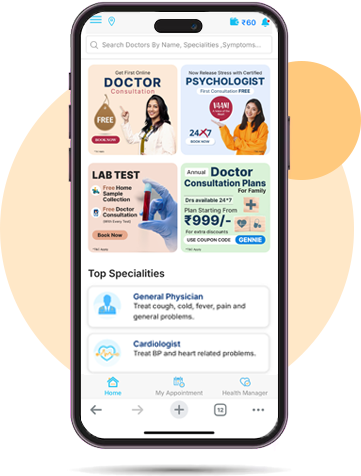A Gynaecologist is the Answer to Your Reproductive Health Problem
March 10 , 2023

Due to biological and gender-related distinctions, being a man or a woman has a substantial effect on one's health. Because they are often discriminated against due to sociocultural issues in many nations, the health of women and girls is a topic of particular concern.
To get a proper consultation to cure all your problems and doubts, the best gynecologist in jaipur is here at Health Gennie with their health care kit at your doorstep.
A Condition That Affects the Uterus
Endometriosis is a condition that affects a woman's uterus, which is where a baby develops during pregnancy, in which tissue different from that which ordinarily lines the uterus stretch elsewhere. It can extend to the bladder, bowels, behind the uterus, or ovaries. Seldom does it spread to other body regions.
The result of "misplaced" tissue is pain, infertility, and heavy periods. The areas of pain are typically the abdomen, lower back, or pelvis. Some women with endometriosis have no symptoms, and their inability to become pregnant may be the first indication of the condition.
Non-cancerous Growth in and on the Uterus
The most prevalent tumour in women of reproductive age is uterine fibroids. Fibroids consist of muscle cells and other tissues that grow in and near the uterus, or womb, wall. Fibroids have no recognised cause. Being overweight or African-American is a risk factor. Fibroid symptoms include the following-
- Backache or leg pains
- Heavy menstrual bleeding
- Pelvic pressure or pain
- Constipation
- Frequent urination
- Difficulty emptying the bladder
- Periods lasting more than a week
However, some females won't exhibit any signs. For this reason, you must visit your doctor for regular check-ups.
Chronic Bladder Pressure in the Bladder Area
Interstitial cystitis (IC) is a chronic urinary ailment that causes repeated pain or discomfort in the pelvic area or bladder. Inflammation or irritation in the bladder walls is a common symptom of IC and can result in scarring and rigidity of the bladder. Although IC can affect anyone, women are more likely than men to get it. Some people either exhibit some or all of the symptoms below:
- Mild pain in the pelvis or abdomen.
- Plenty of urination.
- A need to urinate right away.
- Pressure in the abdomen or pelvis.
- Tenderness.
- Severe lower abdomen pain
Sexually Transmitted Diseases (STDs)
STDs are infections you can get from having sex with an infected person. Bacteria, parasites, and viruses can be the reason of STDs. Sexually transmitted illnesses come in more than 20 different varieties. For more information on specific STDs, see the CDC fact sheets.
Most STDs affect both men and women, but in many cases, the health problems they cause can harm women. An STD during pregnancy might seriously danger the unborn child's health.
If you have an STD caused by bacteria or parasites, your doctor may treat it with antibiotics or other medications. If you have an STD caused by a virus, there is no cure, but antiviral medicines can help control symptoms. Sometimes medications can control the disease. The use of latex condoms reduces the risk of contracting or spreading STDs but does not eliminate them.
Cells Are Affected in the Lower Region
Young women typically don't think much about cancer, although the human papillomavirus (HPV)-caused kind is a severe hazard. More than 11,000 women suffer the illness annually. Many are of reproductive age. The benefit: Early detection and treatment are made possible by Health Gennie. The drawback: Numerous therapies result in infertility.
Polycystic Ovary Syndrome (PCOS)
A woman has polycystic ovarian syndrome when her adrenal glands or ovaries produce more male hormones than regular. One result is the development of cysts, which are fluid-filled sacs, on the ovaries. PCOS is more prevalent in obese females. Heart sickness and diabetes can have an
effect on girls with PCOS. Before they attempt to get pregnant, many women are unaware that they suffer from this prevalent infertility cause. It has to do with a hormonal imbalance that interferes with ovulation and may cause:
- In one or both ovaries, cysts (fluid-filled sacs)
- irregular cycles
- Excessive hormone levels may result in the excessive body or facial hair.
- Baldness or thinning of hair.
- Acne, oily skin, or dandruff
Ask Gynecologist Near Me for advice on how to get pregnant and have a safe pregnancy if you have PCOS.
HIV/AIDS
The human immunodeficiency virus is known as HIV. Specific immune system cells are affected by HIV (called CD4 cells). HIV can sooner or later kill so many of these cells that the body is not capable of combating infection. HIV cannot be eliminated using the human body; therefore, once anyone has it, they will always have it. Although there is presently no cure, the spread of infection can be managed with proper clinical attention. The virus that can cause acquired immune deficiency syndrome, additionally recognised as AIDS, is HIV. AIDS is the advanced stage of HIV infection in which the affected person's immune system has been severely compromised.
A Condition Where Ovaries Stop Working
When the ovaries stop producing eggs normally before the age of 40, it is referred to as primary ovarian insufficiency. Your ovaries resist releasing eggs or produce abnormally low levels of the hormone oestrogen when this occurs.
Primary ovarian insufficiency and premature menopause are two distinct illnesses that are very commonly confounded. Years of infrequent or irregular periods are common in women with primary ovarian insufficiency, and they may even become pregnant. Yet, prematurely menopausal women stop having periods and are unable to conceive.
In women with primary ovarian insufficiency, raising oestrogen levels can help prevent some side effects of low oestrogens, like osteoporosis.
Routine of Life
The most common causes of infertility are issues with ovulation, such as PCOS and POI. Without ovulation, there are no eggs to fertilize. In addition to age, weight, and sexually transmitted diseases, certain aspects of your lifestyle may also play a role.
Some aspects include such as smoking, drinking too much, stress, and a poor diet are all contributing factors.
Conclusion:
A gynaecologist is a doctor who specializes in the treatment of female reproductive problems during their life. A pelvic exam is a good idea every year if you have irregular menstrual bleeding, menstrual problems, or are amid perimenopause. In this blog, you must have learned about your reproductive health. Consult one of the top gynecologist in jaipur to ease away your worries related to your reproductive health.
Disclaimer:
The information on this blog is not a substitute for any professional medical diagnosis or treatment. The blog contains text, images or graphics are solely for informational purpose. Before implementing the information mentioned above, seek the advice of a professional doctor regarding any doubt or question you may have about the medical condition or treatment. Also, take the advice of a professional health care provider before making changes in your health care routine.











